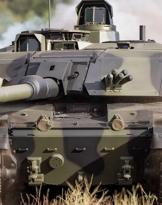Unlike Al-Qaeda and its "solitary" footprint aimed more at the single and blatant attack than at the creation of an empire (not even Bin Laden had theorized this), the Caliphate finds support throughout the Middle East and could direct its expansionist aims in Saudi Arabia.
According to the Jamestown Foundation, a research and geopolitical analysis institute, in addition to confronting the governments in Iraq, Syria and hostile militias, the Islamic State has a series of ambitious goals that include Saudi Arabia.
According to the latest analysis by the Foundation, the Islamic State is concentrating its efforts towards a future attack on Saudi Arabia.
.jpg)
In an audio statement released last fall, ISIS leader Abu Bakr al-Baghdadi spoke of expansion in the "lands of al-Haramein" (two holy places), even refusing to call it Saudi Arabia. In fact, the Caliphate considers the Saudi royal family unworthy of any recognition.
Al-Baghdadi, on the other hand, highlights the two most sacred places in Islam, Mecca and Medina, and proclaims the appointment of regional governors to represent ISIS, inviting followers in Saudi Arabia to recognize and follow their leadership.
Al-Baghdadi has also launched a sort of call to arms, inviting the Saudis to attack the soldiers of "that country".
"Al-Saloul (offensive reference to the Al-Saud family), will soon fall, our black flag will fly over Mecca and Medina."
Last January, a group of militants infiltrated from the north-east of the country, with a kamikaze attack that caused two deaths. The militiamen were then neutralized by the border police.
The apparent animosity towards Saudi Arabia is considered the cause of the Saudi government's closeness "with the corrupt country of the United States, which aims to control the Arab and Islamic world".

Attacking Saudi Arabia would mean triggering a large-scale conflict. Isis has expanded into countries in crisis, with no control over the territory or depths divided within them. It would be different to attack Saudi Arabia, a country endowed with the second most powerful army in the Middle East after Israel with 150 thousand professional soldiers (certainly not defenseless shepherds). Because if it is true that on the one hand the Saudi laws on gender segregation, they are an affront to every kind of human and logical right, on the other the country is closely linked to the United States.
Several billionaire interests and business relationships bind the two countries in an indissoluble way. If ISIS really decided to attack Saudi Arabia, the American intervention (also thought of with a land intervention) would not be so remote.
Isis should do its accounts well. The Caliphate has many friends in the Middle East, but also many enemies. Opening more fronts would be a gross error already seen in the past, while attacking countries structured for a defensive war and equipped with attack capabilities would not be a wise choice.
 The Saudis have as their first line of attack and supremacy 170 F-15 Eagle, ninety Tornadoes and fifty EFA 2000. And the ISIS, we remember, does not have an air force.
The Saudis have as their first line of attack and supremacy 170 F-15 Eagle, ninety Tornadoes and fifty EFA 2000. And the ISIS, we remember, does not have an air force.
If this were not enough, it would be appropriate to remember the 400 Abrams tanks for altogether 1300 armored.
Finally, one last fact: the Saudis do business with France, Great Britain and Russia. Attacking Saudi Arabia would mean snatching all the contracts in progress and Moscow has already hinted that it is ready to take the field to defend its interests, without any mandate from the UN.
Franco Iacch

(photo: Boeing / BAE Systems / archive / US DoD)












